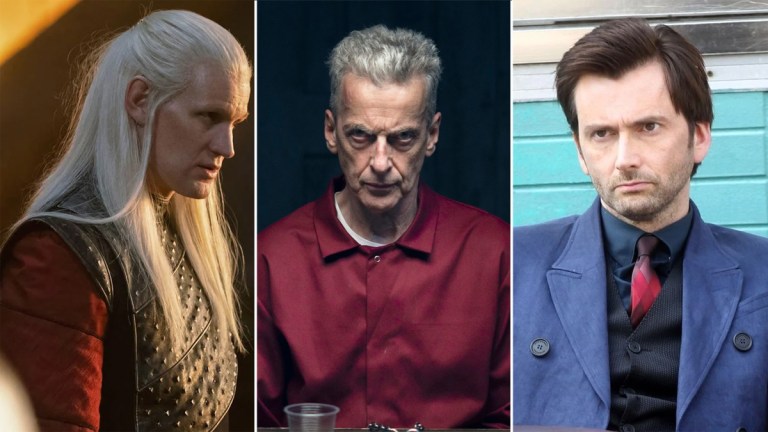Why Matt Smith and the Other Doctor Who Actors Make the Best On-Screen Baddies
If Matt Smith, Peter Capaldi, David Tennant and their predecessors are anything to go by, Jodie Whittaker should be lining up some villain roles after she exits the TARDIS.

In House of the Dragon, Matt Smith practically walks away with every scene he’s in. Only Milly Alcock really gives him a run for his money, but even then, they elevate each other’s performances rather than distracting from them.
But even so, there is something familiar about Daemon Targaryen. The mirthless laughter. The smile that only reaches just below the eyes. The way he seems mildly amused at being threatened, and enjoys nothing more than a really good nemesis. Viewers who have seen Smith as Doctor Who’s Eleventh Doctor will recognize a lot of the old notes.
This isn’t the first time he’s done this. We won’t speculate as to whether Jared Leto slept upside down, drank only human blood or tried to navigate by echolocation to prepare for his role in Morbius, but throughout the film he’s consistently outperformed by Matt Smith phoning in a ‘What if the Doctor was a bit of a dickhead?’ performance.
Smith is not the first do this either. David Tennant left behind the TARDIS straight into the arms of evil, this time in the form of Kilgrave, Jessica Jones’s “Purple Man”. Kilgrave is a rapist, abuser and murderer, but he also has the Tenth Doctor’s estuary accent, his taste for a smart suit, the Tenth Doctor’s cheeky grin and yes, also his anger. Even Kilgrave’s power, to force his victims to obey his every command, feels akin to the Tenth Doctor’s gift of the gab. And that’s just one of the villainous roles Tennant has made his own.
Meanwhile, recently the Seventh Doctor himself, Sylvester McCoy, starred opposite Game of Thrones’ own Maisie Williams in the horror film, The Owners. McCoy plays a doctor (Ha!) who at first glance appears like a sweet little old man, with an almost paternal attitude to the young characters he encounters. Yet even when he is tied to a chair and threatened with torture, you cannot escape the feeling he is somehow in control of the situation, and his apparent innocence belies a much darker truth.
For fans, it is not a film you can watch without sensing the ghost of McCoy’s Doctor, particularly the darker iteration of the character he has continued to play in the audio plays.
And finally, Peter Capaldi, the Twelfth Doctor, is returning to TV in a series written by ex-Doctor Who showrunner Steven Moffat, The Devil’s Hour, where he will be playing “a murderous obsessive”, and looks all kinds of dark and creepy in the trailers.
Going to the Dark Side
The lineage of Doctors contains a host of extra-curricular morally dubious roles. Not long after finishing his one and only season of Doctor Who, Christopher Eccleston played Malekith in Thor: The Dark World. Poor Eccleston joined the MCU to find himself delivering cod-Shakespearian dialogue with echoey voice modulation, like a C-list Stargate: SG-1 villain. Imagine if, instead of that, Thor: The Dark World had set Thor up against a working-class dark elf with a northern accent, coming at Asgard like an angry, super powered Mick Lynch. Yes, it would have been some serious typecasting for Eccleston at a time when he desperately did not want that, but he was never going to enjoy the MCU anyway, and wouldn’t his take on an Evil Ninth Doctor have made for a much better film?
Back to the other post-TARDIS Doctors. Jon Pertwee took a villainous turn in The Young Indiana Jones Chronicles, which means images exist of the Third Doctor in a Nazi uniform. Even Tom Baker turns up as “Zebad” in The Magic Roundabout Movie, giving possibly the hammiest performance of his life. Colin Baker, meanwhile, preceded his run in the TARDIS by playing the villain Bayban in Blake’s 7.
After leaving the TARDIS, it makes sense for an actor who has played the former Time Lord to go dark. After playing Every Child’s Best Imaginary Friend for a few years, it’s understandable that you might want to show a bit of range. But while these actors might want to leave the Doctor behind, the Doctor never fully leaves them.
This can be more of a feature than a bug. After all, if you want a scary and unnerving bad guy, what better way to disturb the audience than giving them the face of a favourite childhood hero? David Tennant’s extremely Doctor-ish take on Kilgrave was disturbing because, in so many of his mannerisms, he really did resemble the hero we’d followed for years until then.
But there is more going on here than ‘Haha! The actor you thought was a goodie is now playing a baddie!’ This happens for a reason.
Evil of the Doctor
The Doctor has always been prone to a bit of villainy. He basically is the villain of the first couple of Doctor Who stories. He kidnaps two teachers, threatens to smash a caveman’s skull in with a rock, lies about a TARDIS component being broken so he can explore a dangerous planet, then when that backfires and they become stranded there, he manipulates a pacifistic people into violence primarily so he can steal that component back.
It’s a version of the Doctor that Colin Baker channelled hard for his incarnation, starting off by outright strangling his companion, and ending with an epic arc that had him fighting the Doctor’s own future evil side. From there we go to Sylvester McCoy’s arch-manipulator, Christopher Eccleston laughing as he attempts to torture-murder a Dalek, coming full circle to David Tennant’s sinister “Time Lord Victorious!” speech, and Matt Smith’s foreboding “Good men don’t need rules. Today is not the day to find out why I have so many.” And of course, Capaldi’s first season might have been subtitled “Is the Doctor Actually a Bastard?”
There is a popular interpretation of the character, most clearly articulated by Steven Moffat’s novelisation of ‘The Day of the Doctor’, that “The Doctor” is only a persona, adopted by an ancient, angry yet tragic alien god. “The Doctor”, the theory goes, is a mask to comfort companions and children, that covers up something far older, darker and stranger than they can imagine. It is a version of the character Matt Smith plays particularly well.
More than that though, the qualities that make an actor a great Doctor are simply the ones that make a great villain. For a great villain you want someone who can demand everyone’s attention when they are in the room. Someone who can do scary and likeable, even (especially) funny. Frankly, somebody who is great at delivering a monologue. But also, part of the Doctor’s job is to never behave in quite the way you expect.
As Jodie Whittaker comes to the end of her reign as the Doctor, it has to be said she’s been given very little opportunity to delve into that side of the character. But if she’s figuring out what she wants to do next, she could do worse than seeing if there are any good serial killer roles going…
